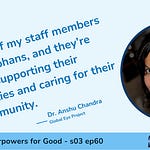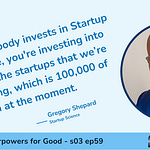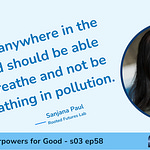Devin: Apolo, what is your superpower?
Apolo: I would say my superpower still relies on a foundational component of hard work. While that's a broad term, I think that we can talk about resilience and passion and hunger and grit and all those things that I think that we typically associate with maybe the Olympics or athletes and things that you have to do that are really challenging and hard. But what I have found, Devin, is that throughout my career, both during the Olympic space and also when I decided to retire and reinvent that the one foundational piece that I could always rely upon was hard work. And that was something that I don't think that I inherently had as a young child. My father had kind of instilled some of these principles associated with that broad term hard work when I was a child. But it wasn't until I really started to feel and see the type of long-term, consistent marginal increases in performance day over day that I would then have to compound over long durations of time where I would find that to be my superpower.
And the reason why I say that is because I was not genetically gifted more than perhaps the top 10 or 15 or even 20 of the world's greatest speed skaters and winter athletes. So, I had to find other areas and mechanisms on which I could lean. There were many times where I looked at the competition and thought, they're better than me, they're faster than I am. They're stronger than I am. They're better genetically designed for this sport, inherently, just naturally more talented. So how do I compete with that? And I had to find areas where I found that maybe they weren't willing to go through. And so, you know, the saying goes, it may take me longer than the average bear, but I think the strength in that is, well, I can't always control the outcome. I am willing to throw myself headfirst into something. Maybe if it's not my greatest strength or my first natural inclination to be performing well at a particular task or sport or career, I think being able to face that fear and go through what they call the gauntlet is a superpower.
And I think we have seen this time and time again of those that we would optically view as being successful. And I think it comes down to that fundamental principle, right. You can plan--you can create these amazing kinds of vision boards, but there's no replacement for the day-to-day grind and consistency. And while others may do things faster or more effectively than you, over the long term and duration, if you stay consistent in those principles, I believe that that's where your real edge is going to come from. That's what I've found with me, is I believe in hyper immersion. I believe in super hard work. And while we cannot always control the outcomes, it's about how we perceive these challenges or so-called failures and then recalibrate them to figure out this is a challenge. This was a learning experience for me. I'm going to take this and grow from it. I'm going to take this and expand from this particular experience in my life. So everyone contains this ability inside of them. That's the beautiful part; hard work is there for anyone to really understand and realize. And with the access to information that we have today, there are no more boundaries. There are no limitations. It's up to you as the sole driver of your life ship to figure out which direction you'd like to steer this thing.
Apolo Ohno is America’s most decorated Winter Olympic Athlete of all time. He competed three times in the Winter Olympics (2002, 2006 and 2010) as a short-track speedskater winning eight medals.
Many people believe they work hard. It’s cliche. But Apolo is the expert. No one is more qualified to model and teach you hard work.
Today, he leverages his skills and experience in many ways, including as a television commentator for the Olympics. He is a New York Times bestselling author, a business leader and philanthropist. He deploys his superpower to improve his performance in all these areas.
Apolo deployed hard work at a fresh, new level for his third Olympic Games. The sport of speedskating was evolving, with the top athletes physically different from his first Games. They were becoming “skeletal” above the waist with all their muscle in their lower bodies. Many were drawn to the sport because they had been born with this body type. Apolo had to rebuild his body. He lost weight and gained strength, keeping him at the pinnacle of competition. He won three medals at those 2010 Games, becoming the most decorated Winter Olympian in U.S. history.
Today, Apolo deploys all his energy to accomplish a single objective. “My main fundamental goal at the end of the day is to help others succeed.” Helping you learn to model hard work is one way he does that.
Building your capacity for hard work will help you make this a superpower, one that will enhance all your other strengths as well.
How to Develop Hard Work as a Superpower
Apolo had to learn hard work in much the same way you have. He trained for his first Olympic Games in 2002 as a teenager, providing him an opportunity to learn a skill that would serve him for the rest of his life, not just in speedskating.
Apolo shared some specific, actionable ideas to help you learn how to make hard work a superpower.
1. Prioritize process over prize. Apolo learned early on that at some point, you have to shoot the arrow. Once released, it will go where it will. You no longer have control over it. On the other hand, the process of preparation helps you become something better. By focusing on the process of becoming rather than on the prize, you will get the full benefit even if the arrow doesn’t hit the bullseye.
2. Deploy your introspection. Effort made in the wrong direction is wasted. As you do the hard work of changing the world for good, remember to ponder what you’re doing and why. Periodically, take the time to ensure that your actions align with your fundamental values and guiding principles. Make sure your passion and purpose guide your effort. Apolo would remind you that you can’t work hard all the time and get a benefit. Periods of rest and planning are required for the hard work to yield the desired results.
3. Embrace the challenge. Doing things that matter, especially those few people do—like competing in the Olympics or curing cancer—is difficult. There will be challenges, problems and setbacks. Coping with those issues will make you stronger and more capable. Embrace the challenges as a central part of your effort.
As a bonus, Apolo notes that incorporating play into your work makes it more enjoyable and sustainable. Put another way, having fun will help you do more reps. The more you do, the better you’ll become.
When other people brag about their hard work, compare their experience to Apolo’s. He may be uniquely qualified to teach you how to do it. Implement his three lessons into your life, and you can make hard work your superpower. Think, too, about how much stronger your other superpowers will be if you amplify them with hard work.
This is a sample chapter from my book Superpowers for Good.














